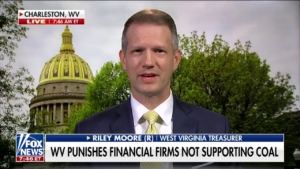American Banker Op-Ed: America’s State Treasurers Wake Up
In his latest American Banker column, Delve CEO Jeff Berkowitz highlights how the politicization of commerce has now engulfed U.S. state treasurer’s offices. To see how firms that rely on institutional capital will have to prepare for the oncoming scrutiny, read the except below, then head to AmericanBanker.com to read the full article.
In the November midterm elections, the twin tides of progressivism and populism will crash ashore, and financial institutions will need to look further down-ballot than ever before to assess the risks they face from incoming elected officials. While governors are the main state executives shaping policy debates, now other statewide officeholders that traditionally focused on specific government functions are advocating for policy changes as well, and they have banks and asset managers in their sights.
This shift was on full display this summer as a number of major financial institutions found themselves under fire from an unexpected source. Both Texas Comptroller Glenn Hegar and West Virginia Treasurer Riley Moore announced the disqualification of a number of banks and asset managers under recently passed laws prohibiting their states from doing business with “financial institutions that are engaged in a boycott of energy companies.” The investment firm Morningstar felt similar heat after Arizona Treasurer Kimberly Yee warned the firm its environmental, social and governance ratings subsidiary was violating her state’s anti-BDS law. Last September, Yee was the first of seven state financial officers to divest pension funds from Unilever after its subsidiary Ben & Jerry’s announced it would no longer allow sales in Israeli settlements. These moves follow Maryland Comptroller Peter Franchot’s 2019 declaration that his state’s pensions would divest from any and all Alabama-based companies in reaction to that state’s strict abortion law.
Subscribe to Receive Insights
"*" indicates required fields
These actions may seem like unconnected responses to disparate political debates but taken together they signal a larger transformation of state treasurers, 36 of whom are independently elected. State financial officers are just the latest down-ballot statewide officeholders to recognize political opportunity in policy advocacy. The massive tobacco settlement in the late 1990s helped state attorneys general recognize they could move beyond straightforward law enforcement to creative legal interpretations that pressure disfavored industries or signal opposition to a president. …
Now, state treasurers are realizing they can wield similar political influence given they both regulate and participate in financial markets. In endorsing the Republican in this year’s California controller race, the East Bay Times expressed concern that the Democratic candidate viewed the role “as being a ‘social justice warrior’ who uses the audits of the office to lobby for policy change.” The New York Times recently raised the alarm over “a coordinated effort by state treasurers to use government muscle and public funds to punish companies trying to reduce greenhouse gases” or “embrace environmental, social and governance priorities.”
Continue reading at AmericanBanker.com to know what you should do to prepare for the oncoming scrutiny.



